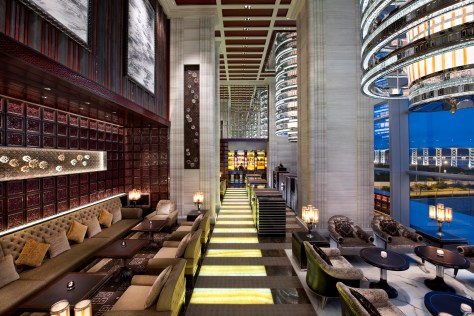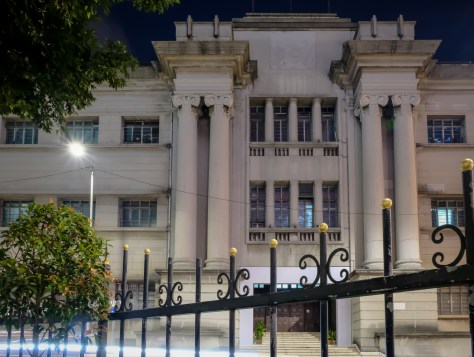Discover the power of Macau, a dynamic city on its way to becoming the richest place in the world. Despite the innovation and modernity, there is still a slow pace to the city which has a rich, culinary, cultural and architectural heritage.
Macau is a smorgasbord of experiences. It is both a city of the future and of the past. It is raw, it is cultured, it is loud, it is tranquil. It simultaneously assaults the senses and heals them. It’s picturesque and gaudy. It is a city of the East, and of the West. It’s welcoming and hospitable yet also gritty and edgy. It is a gastronomic adventure waiting to be experienced and a living museum. However, one thing it most definitely is not, is Monte Carlo or Las Vegas, so please stop with the comparisons.
While a significant portion of Macau’s economy comes from gaming, it’s not, by any comparative estimate, like other casino cities around the world. It’s an entirely different beast from Nevada’s gambling hub. Macau is not the Las Vegas of the East – it’s so much more. While some might debate Las Vegas’ chicken and egg situation (which came first, the city or the casinos?), no one can deny the historicity of Macau, which has a colourful past and a wealth of cultural heritage. Also, unlike Monte Carlo, which boasts one of the oldest casinos in the world, Macau’s transformation into a gaming megalopolis is fairly recent (although Gambling first appeared in the 1850s) and there is so much to enjoy other than gaming.
The Lotus City Blooms
This December marks the 20th anniversary of the former Portuguese colony’s return to China. Yes, at the end of this year it will have been two decades since the Portuguese lowered their flag and returned Macau after 442 years in charge. The new green flag that went up in its place features five stars, a bridge, four lines of water that represent Macau’s history as a port, and a lotus flower.
As one of the most significant flowers in Chinese culture, numerous lotus sculptures can be found around Macau and it is celebrated during the annual Macau Lotus Flower Festival, taking place over the first two weeks of June this year.
However, flowery symbolism aside, for many the real handover of Macau occurred not in 1999, but in 2001, the year when the 39-year casino monopoly came to an end. Since then there has been a gaming revolution in the city and Macau has mushroomed into a magnificent success story.
Deviating from the Dice
When the market opened, Macau underwent a metamorphosis of monumental proportions. Big international players fell over themselves to get a piece of the pie and it was mainly all focused around a small piece of reclaimed land known as Cotai (named after two flanking islands, Coloane and Taipa). For a while Macau went full-throttle and progressed into a hungry gaming hub. Impressive mountains of steel and glass were shaped into resplendent structures as Cotai Strip took shape.
However, after a slump in revenue in 2014 they learned not to put all their chips into one basket. They realised there is more to life than blackjack and they have been diversifying ever since. Keen to bring in different breeds of travellers, the city now takes a more holistic approach to tourism and new attractions have been popping up, with great family-style entertainment able to be found in the city alongside awardwinning dining and leisure experiences. The city also now stages regular international-grade art, cultural and design events.
Some of Macau’s top entertainment offerings include the world’s largest artificial wave pool at Galaxy Macau; one of Asia’s largest virtual reality gaming facilities in Broadway Macau; the world’s first Batman-themed multisensory 4D flight simulation ride; as well as many permanent performances and exhibitions. Running now until early May this year there is a unique Harry Potter Film Concert Series, with a live orchestra accompanying the films. In October, Backstreet Boys will be performing, and a Broadway-style production of Kung Fu Panda is coming soon.

Superlative City
One of the first mega-resorts which graced the shores of Macau was The Venetian, home to the largest casino in the world. It’s also the largest single structure hotel building in Asia, and the seventh-largest building in the world by floor area. MGM Cotai also boasts a world-first, with the largest permanent indoor LED wall on the planet in their theatre. The 13 is another hotel creating buzz, inspired by the Palace of Versailles with 200 multilevel, all-villa suites, 24-hour butler service, and even a fleet of bespoke Rolls-Royce Phantoms (some of the most expensive Rolls-Royce Phantoms ever built).
One of the latest and greatest hotel openings is Morpheus, designed by the late Zaha Hadid. The arresting otherworldly structure features the world’s first free-form exoskeleton. It’s a marvel to behold, with a fluid grid of steel enveloping the 40-storey glass exterior. Inside, the refinement continues, with 770 rooms, high-roller facilities, a futuristic rooftop pool, a minimalist art gallery and not one, but two Alain Ducasse restaurants.

Heritage Allure
One of the saving graces that has helped Macau attract a variety of tourists is its history. It was the first and last European colony in Asia, and there are many sites which reflect this legacy. Macau has hundreds of years of heritage and in 2005 UNESCO inscribed the historic centre of Macau as a World Heritage site.
The centre of Macau has, consequently, become a living and breathing example of heritage conservation done right. Walking on the Portuguese-style cobblestone pavement is like taking a stroll in Lisbon – the lanes have an aesthetic sense of neoclassicism about them. There are also colonial mansions, art deco buildings and tranquil parks, which all feature equal doses of Eastern and Western influence. More than 22 sites in the city have been recognised for their cultural and historical significance, including Senado Square, the Ruins of St. Paul’s, Guia Fortress and Lighthouse, numerous temples and churches, as well as many more distinctive structures which deserved to be seen when in Macau.
Dynamic Food Landscape
Another way that Macau has managed to extend its appeal is through its focus on dining. There is an ancient Chinese proverb which says ‘‘to the people, food is heaven” and in Macau this is pretty much gospel. They say the best way to experience a culture is through food and UNESCO has recognised Macau for its food as well.
The city has been designated a “creative city of gastronomy” and the diverse foodscape reflects this. With just about every cuisine under the sun and top-quality street food comparable to some of the high-end offerings available in the city, Macau is one of the most exciting food destinations in Asia. The Michelin Guide Hong Kong Macau 2019 (shared between both cities) features a total of 19 starred restaurants, with 30 stars between them.
Hospitality Hub
Macau has also been recognised by Forbes – not just for its dining, but for the great hotels and spas that are to be found in the Special Administrative Region. This year Macau was awarded the largest number of Forbes five-star restaurants in the world out of any city, and the city also had the secondmost five-star hotels, beaten only by London. Macau also has the most five-star spas, with nine considered top-class by Forbes. Mandarin Oriental, Macau was a Forbes triple fivestar winner, earning top stars for the hotel, restaurant and spa.
In fact, the Mandarin Oriental, Macau is one of the properties that best encapsulates the diverse experiential elements of the city. As the only five-star, non-gaming luxury hotel on the peninsula, it is a modish haven of tranquillity which has a charming dash of Portuguese flair.
Unlike the mega-resorts of Macau, this hotel comes across more like a warm boutique-style property, and it’s perfectly poised to take advantage of the nearby heritage attractions. Every room in the hotel capitalises on Macau’s dazzling cityscape with floor-to-ceiling windows looking over Nam Van Lake where one can rent a pedal boat. The hotel is a great spot to watch the Macau International Dragon Boat Races (first week of June) and the Macao International Fireworks Display Contest (held in September). It’s a great familycentric spot, with a special turndown service and an outdoor Jacuzzi for the kids and the hotel features a spa which both heals and relaxes guests.
Having mutated into a hospitality heavyweight with global influence, it is clear this urban powerhouse won’t be stopping anytime soon. They recently launched the world’s longest linked sea crossing, the Hong Kong-Zhuhai-Macau bridge, and the city is even poised to take over Qatar and become the richest place on the globe. It is equipped and ready to face the future yet the spirit and soul of old Macau still lives on. It has something for everyone and deserves to be experienced at least once. Like a chameleon, Macau is, and can be, many things, but Vegas, it most definitely is not.
Originally published in World Travel Magazine, click here for PDF.







